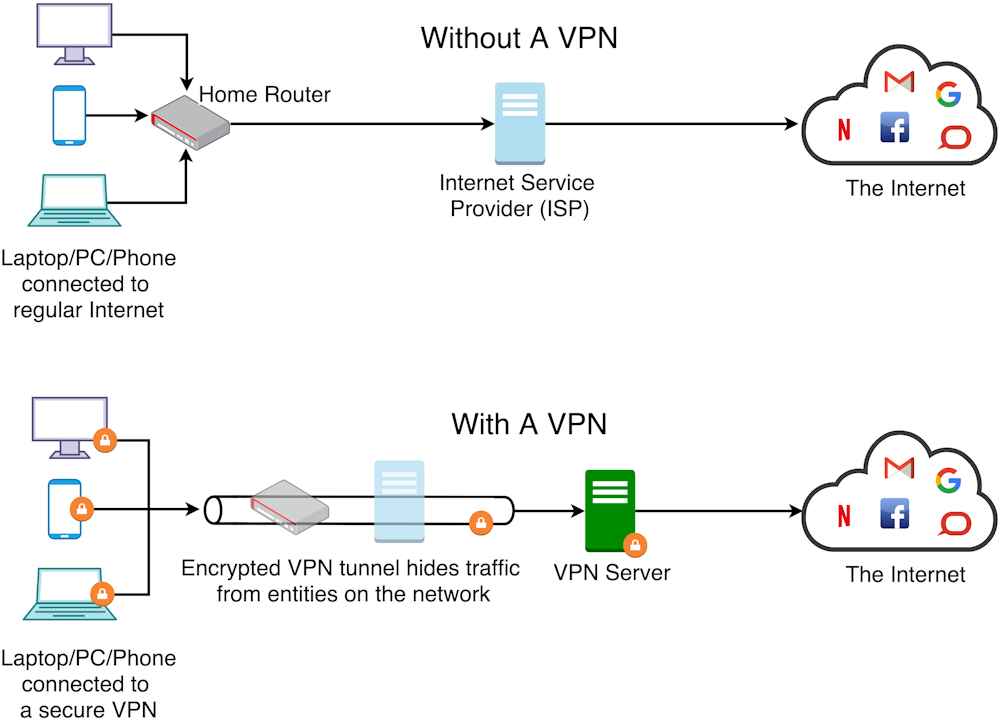Posted on March 22, 2020 by Braintrace
Due to COVID-19, many of us are forced to work at home. The Braintrace team came together to bring to you tips to stay secure while away from the office. We created this article for our IT professional clients to share with their colleagues. Follow these steps to create a secure home office.
 Use a Virtual Private Network (VPN). A VPN takes the information off your public cable network and creates a connection to your companies' private network. This will allow you to access company data securely. Contact your company's IT Department for instructions on how to setup. Do not use streaming media sites while connected to the VPN. Your IT Department will thank you and so will the other VPN users.
Use a Virtual Private Network (VPN). A VPN takes the information off your public cable network and creates a connection to your companies' private network. This will allow you to access company data securely. Contact your company's IT Department for instructions on how to setup. Do not use streaming media sites while connected to the VPN. Your IT Department will thank you and so will the other VPN users.
Make Sure Your Home Router WiFi and Firewall passwords are Not Default. When you originally got your router, you might have been given a default password. If you never got around to changing this, we strongly encourage you to do so. Also, disable access to your router's admin portal from the Internet.
We also recommend you enable WPA2 or WPA3 encryption for WiFi.
You can search your routers/firewall manufacture and model number for instructions on how to change the password and set up encryption on your WiFi SSID.
Furthermore, contact your internet provider and enable two-factor authentication (2FA), also known as multiple factored authentication (MFA). This will provide an extra layer of security if your password is ever breached. In fact, we recommend you set up 2FA on all accounts such as Email, Facebook, Google, and Financial portals.
Access and view information in private. This step is especially essential if you are remotely working at a location where many people are coming and going. If you are viewing private information, be sure to lock the screen when you leave the computer, avoid printing, remove all papers from your desk (when you are not present), and to place your laptop in locked storage when not in use. You can use these same recommendations at the office. Our Braintrace employees live by these rules.
Update your personal computer. If you are working out of your own computer, make sure all the security patches are up to date for your operating system, anti-virus, applications, and web browsers. Make sure the log in to your personal computer is at least 18 characters with different letters, capitalizations, numbers, and symbols all included.
Separate personal from work. Before you access company information, be sure to logout of social media platforms, personal email, and clear out your browser's history. We advise this because many times, we can get distracted, and you forget that you are in your email, or you are on some social media account. All of a sudden, you are broadcasting information that is unauthorized for the public.
Unplug all home listening devices. Unplug devices such as Google Home and Amazon Echo. This might be a strange thing to consider, but when it comes to protecting your organization's data, you should never and cannot take chances. Also, you never know what applications can be using these home listening devices to listen to your conversations as well.
Encrypt the Startup Disk. Doing this will allow you to make sure that only people who are authorized will ever look at your data. If your laptop is stolen, the perpetrators will not be able to access any file unless they figure out the password. Make sure to store your encryption key in a safe location that is not on the hard drive you are encrypting, in case you need to use the key later to restore data on your computer.
Windows 10: https://www.youtube.com/watch?v=9DK0becNf6s
Mac: https://www.youtube.com/watch?v=hFUpCE6-8Ro